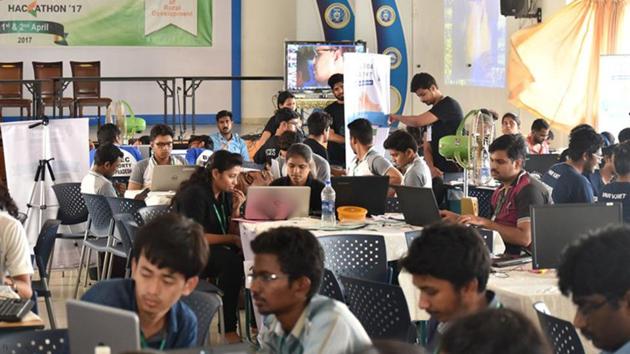Smart India Hackathon 2018: Students get an opportunity to crack 1,200 problems of the country
Persistent Systems is organising the event with assistance from human resource development ministry and All India Council for Technical Education to get student participation.
Pune It’s perhaps the biggest hackathon in the world where you have countrywide participation as 1,10,000 students came up with 17,000 solutions to 1,200 problem statements when the Smart India Hackathon 2018 was announced. On March 30 and 31, 2018, over 36 hours, 10,000 students representing 1,296 teams spread over 28 centres across the country will participate in the second edition of the Smart India Hackathon 2018.

It all started last year when Abhay Jere who heads Persistent Labs came up with the idea to offer a challenge to the students across India. Anand Deshpande, chairman and managing director (CMD), Persistent Systems, supported the move and thus was born Smart India Hackathon in 2017.
Deshpande said, “The general belief is that there is not enough being done for the student community. There is no open innovation happening in colleges and even the labs there do not offer them real challenges. So we thought why not harness this energy and see what can come out of it?”
Persistent Systems reached out to the human resource development (HRD) ministry and the All India Council for Technical Education (AICTE) to get student participation. “This year, 29 ministries and 17 state governments each put out 1,200 problem statements that could be solved from the information and communication technology (ICT) point of view. Our team curated these down to 408 problems and put it out to all the technological colleges in India. The response was overwhelming. About 17,000 ideas were generated from 1,350 colleges. This meant 1,10,000 students were involved in finding solutions for problems put out by various ministries. We whittled it down to 1,296 teams.”

The hackathon this year has two editions, The software edition is a 36-hour software product development competition and the hardware edition where teams will compete in a five day non-stop challenge to build hardware solutions. From 8 am on March 30 to 8 pm on March 31, 2018, these 1,296 teams will be spread over 28 centres (in Pune there are two centres National Chemical Laboratory (NCL) and College of Engineering, Pune (COEP)) will work hard to find solutions to the problems put forth by ministries.
Some of these problem statements are a solution to predict drought in a protected area. This is from the ministry of environment, forests and climate change. The ministry of health and family welfare is looking for a solution in the telemedicine system that can work on low bandwidth. The Maharashtra government wants an application that can map disabled friendly locations across the state. The Council of Scientific & Industrial Research (CSIR) is looking for an anti-adulteration system for fuel road tankers.
“All the 28 hackathon centres will have either a minister himself attending or a representative of the ministry. Last year, the Prime Minister at 11.30 pm addressed the participants of the hackathon for over one hour where he spoke about technology for half an hour and then interacted directly with six centres that we had zeroed in to share their ideas and question them on their solutions. The PM has on other occasions too spoken about this hackathon which makes me think that he is mighty impressed by the initiative. This year too we hope he will address the students,” he said.
Each of the 27 ministries and 17 state governments will give Rs One lakh to the winner who finds a solution to their problem statement, Rs 75,000 to the 1st runner-up, and Rs 50,000 to the 2nd runner-up. In addition to this, Persistent Systems, Deloitte and KPIT will give a cash prize of Rs 10,000 to all the winners . Apart from the cash prize that the winners get, they also have the opportunity to then take their idea forward with the ministry concerned and work on it as a project. “Or, “said Deshpande, “they can take it to the market and become entrepreneurs.” Though the hackathon is poised to take off to the next level, Deshpande is hoping the government takes the lead and forms an organisation that will look after the future hackathons.
“It takes a lot to put this up. And without the government’s participation Persistent would never have been able to do it. The railway ministry offers the students discounted tickets. AICTE gives them travel allowance. The local colleges provide lodging and boarding. We are talking to the government to create a permanent organisation that runs this event.” Meanwhile, innovation has got a shot in the arm through these hackathons.





